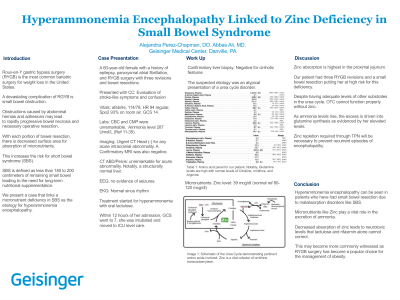Monday Poster Session
Category: Small Intestine
P3258 - Hyperammonemia Encephalopathy Linked to Zinc Deficiency in Small Bowel Syndrome
Monday, October 28, 2024
10:30 AM - 4:00 PM ET
Location: Exhibit Hall E

Has Audio

Alejandra Perez-Chapman, DO
Geisinger Health System
Danville, PA
Presenting Author(s)
Alejandra Perez-Chapman, DO, Abbas Ali, MD
Geisinger Health System, Danville, PA
Introduction: A complication of Roux-en-Y gastric bypass surgery (RYGB) is small bowel obstruction. Necessary resection increases the risk of short bowel syndrome (SBS). Limited reports have shown a correlation between hyperammonemia and RYGB patients. We present a case that links a micronutrient deficiency in SBS as the etiology for this association.
Case Description/Methods: A 60-year-old female with history of RYGB with a chronic enterocutaneous fistula (ECF), presented for evaluation of stroke-like symptoms and confusion. Glasgow coma score (GCS) was 14. Urgent brain imaging did not show acute changes. Labs were significant for albumin at 1.9 g/dl, zinc at 39 mcg/dl, ammonia at 287 umol/L, and normal creatinine. Abdominal imaging showed a structurally normal liver. Despite using lactulose, her GCS decreased to 7, requiring intubation. After several bowel movements, ammonia decreased but her GCS remained an 8. The suspected etiology of hyperammonemia was a urea cycle disorder but the gene testing panel returned normal. Notably, the glutamine level was two times the upper limit of normal. After a long hospital course, she was discharged without a clear etiology of her condition. On her second admission for confusion, gastroenterology suggested a liver biopsy with portal pressure evaluation to exclude cirrhosis. Pathology was negative and portal pressures were normal. Rifaximin was empirically started for small intestinal bacterial overgrowth. Despite medical management, she remained confused with an ammonia level of 223 umol/L. She received dialysis, which ultimately resolved her encephalopathy. A micronutrient workup showed multiple deficiencies requiring total parental nutrition (TPN) supplementation. At one-year follow-up, she’s had no recurrent admissions after addressing the micronutrient deficiencies.
Discussion: Micronutrients are essential in regulating biochemical processes in the body. Zinc is a co-factor for ornithine transcarbamylase (OTC), which converts ammonia into urea. Zinc absorption is highest in the proximal jejunum. Our patient had three RYGB revisions and small bowel resection putting her at high risk for this deficiency. Despite having adequate levels of other substrates in the urea cycle, OTC cannot function properly without zinc. As ammonia levels rise, the excess is driven into glutamine synthesis which is seen in this case. Without proper zinc repletion, she would have recurrent episodes of encephalopathy.
Disclosures:
Alejandra Perez-Chapman, DO, Abbas Ali, MD. P3258 - Hyperammonemia Encephalopathy Linked to Zinc Deficiency in Small Bowel Syndrome, ACG 2024 Annual Scientific Meeting Abstracts. Philadelphia, PA: American College of Gastroenterology.
Geisinger Health System, Danville, PA
Introduction: A complication of Roux-en-Y gastric bypass surgery (RYGB) is small bowel obstruction. Necessary resection increases the risk of short bowel syndrome (SBS). Limited reports have shown a correlation between hyperammonemia and RYGB patients. We present a case that links a micronutrient deficiency in SBS as the etiology for this association.
Case Description/Methods: A 60-year-old female with history of RYGB with a chronic enterocutaneous fistula (ECF), presented for evaluation of stroke-like symptoms and confusion. Glasgow coma score (GCS) was 14. Urgent brain imaging did not show acute changes. Labs were significant for albumin at 1.9 g/dl, zinc at 39 mcg/dl, ammonia at 287 umol/L, and normal creatinine. Abdominal imaging showed a structurally normal liver. Despite using lactulose, her GCS decreased to 7, requiring intubation. After several bowel movements, ammonia decreased but her GCS remained an 8. The suspected etiology of hyperammonemia was a urea cycle disorder but the gene testing panel returned normal. Notably, the glutamine level was two times the upper limit of normal. After a long hospital course, she was discharged without a clear etiology of her condition. On her second admission for confusion, gastroenterology suggested a liver biopsy with portal pressure evaluation to exclude cirrhosis. Pathology was negative and portal pressures were normal. Rifaximin was empirically started for small intestinal bacterial overgrowth. Despite medical management, she remained confused with an ammonia level of 223 umol/L. She received dialysis, which ultimately resolved her encephalopathy. A micronutrient workup showed multiple deficiencies requiring total parental nutrition (TPN) supplementation. At one-year follow-up, she’s had no recurrent admissions after addressing the micronutrient deficiencies.
Discussion: Micronutrients are essential in regulating biochemical processes in the body. Zinc is a co-factor for ornithine transcarbamylase (OTC), which converts ammonia into urea. Zinc absorption is highest in the proximal jejunum. Our patient had three RYGB revisions and small bowel resection putting her at high risk for this deficiency. Despite having adequate levels of other substrates in the urea cycle, OTC cannot function properly without zinc. As ammonia levels rise, the excess is driven into glutamine synthesis which is seen in this case. Without proper zinc repletion, she would have recurrent episodes of encephalopathy.
Disclosures:
Alejandra Perez-Chapman indicated no relevant financial relationships.
Abbas Ali indicated no relevant financial relationships.
Alejandra Perez-Chapman, DO, Abbas Ali, MD. P3258 - Hyperammonemia Encephalopathy Linked to Zinc Deficiency in Small Bowel Syndrome, ACG 2024 Annual Scientific Meeting Abstracts. Philadelphia, PA: American College of Gastroenterology.
